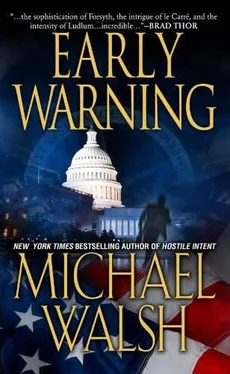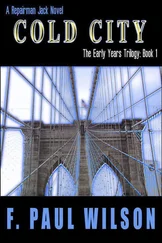Michael Walsh - Early Warning
Здесь есть возможность читать онлайн «Michael Walsh - Early Warning» весь текст электронной книги совершенно бесплатно (целиком полную версию без сокращений). В некоторых случаях можно слушать аудио, скачать через торрент в формате fb2 и присутствует краткое содержание. Жанр: Триллер, на английском языке. Описание произведения, (предисловие) а так же отзывы посетителей доступны на портале библиотеки ЛибКат.
- Название:Early Warning
- Автор:
- Жанр:
- Год:неизвестен
- ISBN:нет данных
- Рейтинг книги:3 / 5. Голосов: 1
-
Избранное:Добавить в избранное
- Отзывы:
-
Ваша оценка:
- 60
- 1
- 2
- 3
- 4
- 5
Early Warning: краткое содержание, описание и аннотация
Предлагаем к чтению аннотацию, описание, краткое содержание или предисловие (зависит от того, что написал сам автор книги «Early Warning»). Если вы не нашли необходимую информацию о книге — напишите в комментариях, мы постараемся отыскать её.
Early Warning — читать онлайн бесплатно полную книгу (весь текст) целиком
Ниже представлен текст книги, разбитый по страницам. Система сохранения места последней прочитанной страницы, позволяет с удобством читать онлайн бесплатно книгу «Early Warning», без необходимости каждый раз заново искать на чём Вы остановились. Поставьте закладку, и сможете в любой момент перейти на страницу, на которой закончили чтение.
Интервал:
Закладка:
Still, losing warriors was one thing; having one of the enemy speak to you in Farsi was another. He sounded like a Brother, from his accent, but his words had been puzzling and mysterious, beginning with his question in French about the number of the names of God and continuing on with various obscure theological questions about the suras and the life of the Prophet, concluding with a discussion of the Twelfth Imam. And then he had lost contact with Brother Alex, whom he now must assume was dead.
But why would a Brother kill Alex? It was possible that it had been a mercy killing, that Brother Alex had somehow been wounded and had been put out of his misery in order to enter paradise. It was also possible that Brother Alex’s security had been compromised, and another of the Brothers had terminated him. It was even remotely possible that Brother Alex had been taken out by one of the New York City Police Department operatives, although the chances that the man would be a native Persian, or speak Farsi like one, were nil.
There was a fourth, and more worrisome possibility, however: that Skorzeny had double-crossed him.
Kohanloo thought for a moment. His eyes fell upon the mini-bar. It was so tempting…In the interests of taqiyya it was permitted a devout Muslim to deceive the enemy. A beer, or perhaps two, would aid in the deception.
That Skorzeny would attempt to euchre him would not surprise him in the least. The man’s reputation preceded him and if, in fact, that turned out to be the truth, it would be the last time he ever did that. For while it was permissible for him, Arash Kohanloo, to deceived a Westerner with false promises, such behavior in an infidel-worse, an atheist-would not be acceptable, and would have to be punished with the utmost Koranic severity.
In fact, as he looked back on it, he realized that Skorzeny had been planning an elaborate deception all along, especially the bit about his not having to come to New York. Clearly, that had been his intention all along: to force Kohanloo to accept the challenge to his manhood and specifically ignore the advice he was being given. Skorzeny had wanted him to supervise the operation from ground zero, and not from the safety of, say, Canada, where the Brothers were numerous and the government almost as naive, trusting, and unsuspecting as those of Scandinavia. Islam had never laid historic claim to any of the lands of the North, not to mention the new world, but now, with so many Brothers acting religiously as an army of infiltration, taking advantage of the enemy’s trusting nature, his generous social-welfare programs (which were really just an inverted form of racism, since the Brothers were discouraged from gainful employment), there would soon be enough Believers to assert Islam’s historically necessary pride of place and conquer all the lands of the West, once and for all time.
He looked at the cell phone that linked him directly to Brother Alex. Should he pick it up and dial again? For one of the few times in his life, Arash Kohanloo hesitated. This was a new experience for him. Having survived multiple changes of regime in Iran, from Mossadegh to the Shah to the Ayatollahs to whatever undoubtedly was coming next, he was used to acting boldly and decisively. In the Middle East, nothing was ever to be gained by caution, except the perpetuation of the same way of life that had obtained for hundreds of years. For all his piety, Kohanloo was a man of the future, not of the past: he looked forward to the inevitable victory of the dar al-Islam and was doing his best to hasten it.
He picked up the phone, a basic Nokia. Then another thought occurred to him:
What if it was the NCRI? The National Council of Resistance of Iran?
That put a whole different spin on things. The NCRI, up to this moment, had been a joke. But the open rebellion against the fixed Iranian elections of 2010 had only served to encourage the diaspora of Iranians, at least half of whom, it seemed, lived in Beverly Hills or elsewhere in the Greater Los Angeles area. In the old days, poor countries used to export their most miserable people to the United States, so that the those left behind might have a fighting chance at survival. Iran had gone history one better: it had exported its best and its brightest and its richest, its doctors and its bankers and its lawyers. The Revolution had driven away precisely those people a functioning modern country needed, and sent them screaming into the arms of the Great Satan himself, to luxuriate in the southern California climate and plot revenge; they were like the post-Castro Cubans, but with more money.
Up to this point, neither he nor any of the mullahs with whom he did such a profitable, if irreligious, business, had given much of a thought to the NCRI. To put the organization in historical context, it was like one of those movements of national liberation that popped up everywhere in the 19th and 20th centuries, groups of raggedy-assed anarchists who threw bombs and occasionally got lucky in their choice of targets, but aside from Princip had very little effect upon the course of human history.
Of course, Gavrilo Princip had had a very great effect upon the course of human history. Incredibly lucky-imagine the Archduke Franz Ferdinand returning by the very same route on which he had dodged Princip’s first attempt on his life earlier that same day-but also incredibly determined, Princip had rearranged the map of Europe and, all unwittingly, doomed the West, although it had taken just about a century on the nose for that fact to become so abundantly clear. The cream of the crop of the infidel had died in the trenches and at the Somme and at Verdun, and those who were not killed were removed from the gene pool three decades later when the same war broke out all over again. As an example of national and cultural suicide, it was unequalled; no wonder their enfeebled descendents wanted nothing so passionately as to terminate themselves, their offspring, and their civilization.
Well, he was here to help them with that. If the West had become a giant suicide cult, Islam was just the death cult it was longing to meet. At last, a battle that had been waged since the seventh century was about to enter its final stages.
He still held the cell phone in his hand. In every operation, once the shooting started, there was something that would go wrong, and almost immediately. War plans were blueprints for buildings that would never get built; what emerged instead was some bastard combination of thought, luck, and happenstance, and you lived with the result until you were strong enough to overturn it, or weak enough to be unable to defend it.
He pushed the redial button.
The phone rang. Once, twice…
The security signal was four rings. Anything after four rings meant the connection was compromised, and that the Brother was considered compromised, whether he was in fact dead or not. A wounded Brother was of no use to him. At four rings, the order would automatically go out to the others, identifying the fallen Brother’s last known location, with the orders that he or she should be terminated immediately. Mercy was an unknown commodity, for only Allah could dispense mercy.
Three times…
Nothing.
Arash Kohanloo’s finger hovered over the Stop button. As soon as the fourth ring ended, he would end the call and send the signal.
Four-
“Hello?”
A voice, in American English. What he expected, but not at all what he expected.
“Who is this?” he found himself saying.
There was a long pause at the other end of the line-of course, there was no line, only the infidel’s technology, which Kohanloo and his countrymen, although unable to duplicate, were only too happy to employ against the enemy-and what sounded like a clicking noise.
“Go ahead please,” came a female voice.
Читать дальшеИнтервал:
Закладка:
Похожие книги на «Early Warning»
Представляем Вашему вниманию похожие книги на «Early Warning» списком для выбора. Мы отобрали схожую по названию и смыслу литературу в надежде предоставить читателям больше вариантов отыскать новые, интересные, ещё непрочитанные произведения.
Обсуждение, отзывы о книге «Early Warning» и просто собственные мнения читателей. Оставьте ваши комментарии, напишите, что Вы думаете о произведении, его смысле или главных героях. Укажите что конкретно понравилось, а что нет, и почему Вы так считаете.












